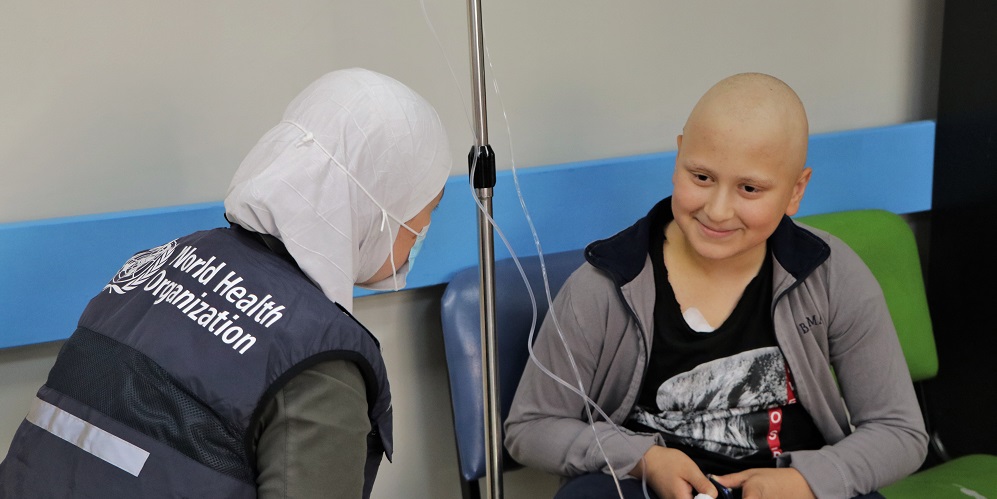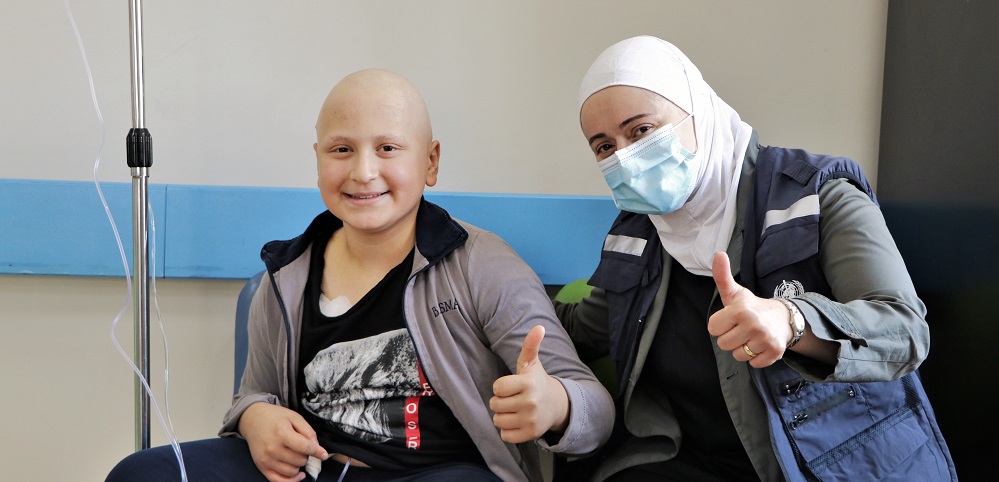
9 June, Damascus - Hamed, a 12-year-old boy from Idleb, Saraqeb, was diagnosed with cancer 3 months ago after getting injured while playing football.
“It all came out of sudden. I was unintentionally hit by one of my friends while playing at the backyard of my home. I was in so much pain and could not move my leg. My parents took me to the hospital and after one month of tests and X-rays, doctors diagnosed the bone cancer,” shared Hamed. For his young age, Hamed demonstrated maturity, strength and optimism to defeat the disease.
“I know the journey is long, difficult and full of pain, but in life we experience up and down moments. I will be a winner as I am a fighter and will not give up,” continued Hamed with great confidence and determination and contagious smile.
Hamed is one of hundreds of children receiving treatment at BASMA Pediatric Oncology Unit in Damascus, operated by WHO-supported BASMA Association, the only nongovernmental organization in Syria that treats children with cancer.
“An opportunity of recovery is the right of every person. The journey is long, yet full of hope. The challenges are increasing similarly to the progress, but we are committed to continue our mission of supporting children,” said Rima Salem, Executive Manager at BASMA Association. “Our responsibility is profound and the cooperation with all our partners enables to find the right path that guarantees continuity of our health services,” shared Rima Salem.
Acknowledging the importance of psycho-social support during the trying times, Hamed is grateful for a chance to inspire peers to think positively. “Experiencing difficulties can bring families together as you cannot do it alone. My parents and siblings were with me in each step, and we grew strong as a family,” narrated Hamed. “I was able to see many blessings from my experience that helped withstand hard times. I have learnt to reach out to others at the hospital, found a lot of other children who I bonded with. Together we support and encourage each other; you can be the light to someone in need, and they can brighten you on a low day,” added Hamed.
Before the conflict started in Syria, cancer treatment services for children and adults were provided free of charge in public health care facilities. As a direct result of the crisis, many patients’ treatments were severely compromised. Health-related challenges became more complex, and Syria’s fragile health system was repeatedly strained through multiple concurrent emergencies due to ongoing insecurity, the COVID-19 pandemic and the socioeconomic situation that continue affecting the availability, access and quality of health services across the country. Currently, over 12.2 million people inside the country need health assistance, who despite incredible strength and resilience are facing a bleak future and increasingly dire living conditions.
WHO partnered with the Kuwait Fund for Development who supported the delivery of essential cancer medicines and contributed to alleviating the suffering of hundreds of cancer patients in Syria. The Government of Kuwait has been a significant supporter of WHO programmes in Syria since 2013. In the past 3 years alone, Kuwait’s contribution to WHO Syria has exceeded US$ 10 million to enhance the Organization’s efforts in strengthening the health system, responding to the vital health needs, saving lives and giving a glimmer of hope, including to cancer patients.
“Shortage in medicines has become an acute problem in Syria and concerted efforts are needed to provide life-saving treatment to cancer patients,” said Dr Iman Shankiti, WHO Representative a.i in Syria. “Kuwait has been a long-standing partner of WHO since the beginning of the conflict, providing health services to all people in need at a critical time when public health services were badly disrupted. Now more than ever, Syria needs solidarity and support to recover the cancer treatment services,” Dr Shankiti added.
In Syria, cancers constitute 9% of noncommunicable diseases. The most common cancer types diagnosed in Syria are the breast (21.3%), lung (9.3%), colorectum (8.2%), bladder (7.1%) and prostate (4.9%) cancer.
WHO in partnership with the National Steering Committee on Cancer Prevention and Control contributes to the hospital-based cancer registry to detect cases and analyse disaggregated data by type of cancer, sex, age and geography. The Organization collaborates with the International Atomic Energy Agency (IAEA) to assess the national capacity of radiotherapy for cancer cases within the framework of the Integrated Mission Programme of Action for Cancer Therapy (imPACT). During 2021, WHO delivered a series of capacity-building workshops attended by cancer registrars, oncologist doctors and radiologists from the Ministries of Health and Higher Education to enhance the capacity of health workers to detect and treat cancer.
The continuous support of donors and partners allows WHO to provide much needed medicines, equipment and supplies for diagnosis and treatment of cancer so that cancer patients like Hamed could recover and have a fulfilling life.





